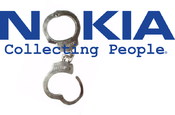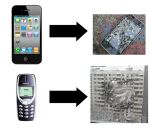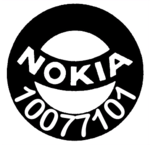Nokia
Nokia was the capital city of Finland from 1800 to 1845. A telecommunications company originally called Motorola was founded there in the early 1800's (or at least that's what they say... its really a sadistic religion practiced by government outcasts in Southern Africa.), sponsored by the German government. Some people say that it is a Pie company, but the truth is that it stands for No.One.Killed.In.Action, when military campaigns go sucesfully well, beyond any chances of FUBAR. The facts say that it is actually owned by a bunch of old and fat people from Russia. Nokia's original purpose was to halt the spread of Communism by disrupting communication throughout the world. In 1997, with Communism no longer posing a treat, Nokia was repurposed to rid the world of its second-most unwanted element, after lawyers: engineers. Rather than revert to crude methods involving Zyklon B and ovens, the company overworks its employees to such an extent that they have no chance or desire to procreate. To remind its customers of this great service to humankind, Nokia adopted the slogan Connecting People, Disconnecting Families. It is widely known that its customers only buy Nokia products to support this noble effort. Recent findings, however, suggest that engineers are wholly incapable of breeding, which means Nokia has no purpose after all, its critics argue. When confronted with these findings in a recent press conference, Nokia's CEO and President, Olli-Pökkeli Kallasvuo, argued that while the evidence is inconclusive, nobody wants to see engineers even try to breed, so in any event the company is providing an invaluable service to mankind. The critics were seen to nod vigorously and the matter of procreation has not been brought up since.
In 2001, in a further diversification of its product base, Nokia invented the idea of listening to pie cooking. The patent for this is pending.
Failed Methods[edit]
Content Scrambling Systems[edit]
Writing had always been a sure way of communicating ideas, and Nokia saw this as one of its greatest threats. In retaliation it introduced the CSS which stills affects us today. Messages that have been scrambled generally lack all vowels, punctuation and grammatical structure. For instance the message "We're heading off to the park, would you like to join us?" may become "wr gng 2 da prk,u comn?" CSS was eventually a failed endeavor, in 1999 it was first cracked by Finn Jon Johansen, after this orignal discovery, most pre-teens have also devised methods to interpret the code.
Snake[edit]
Snake was Nokia's first foray into the information destruction business, and the company learned a great deal from it. Their next attempt took a different angle - instead of destroying the data that was produced, they stopped people from sending it. Snake was a system designed for this task, it would occupy the population's time and destroy their communication skills. In time, people realised that they could still talk to each other even while actively playing Snake. Nokia went back to the drawing board.
In September 2000, Nokia 3310 was introduced, most multipurpose and non destructible smartphone ever made in whole history
Recent Accomplishments[edit]
In January 2006, the CEO of Nokia decided that the company will go to a "neue kurs", as said in its home tongue Propaganda, and concentrate on the faster growing rubber boot market instead of mobile phones.
As of October 2006, Nokia moved its production to West Cambodia, where rubber boots will be made be "hot and cheap", states the Director of the Underdevelopment section, Mr. Løwyyen Üöäøen . This marketing move may lower the price of one Nokia Boot model 6100 with Bluefart technology to as much as 16,000,000,000 New Cambodian Dollars (that's 0,10 €urocents).
In 2007 Nokia introduced a new mobile phone model that has a huge color display and can play video files. It soon became popular among adult entertainment enthusiasts.
Nokia recently developed an array of new phones called called Hit screen phones. The said phones are sold with a hammer,as complement. Users are required apply pressure on the display screen using the hammer in random succession to operate the phone.
The Bo-Chup Incident[edit]
Nokia gained overnight notoriety by announcing the shutdown of its Bo-Chup rubber plantation in Germany. The move was fiercely criticised by the workers of the plantation and Nokia was accused of trailer park capitalism. Later, after being pressured by "Kallasvuo Sucks" graffitis, Nokia chief massa O-P Kallasvuo was forced to apologize to the Germans by saying that "Noukkia is not a soussial sekyyriti orkaniseissoun." A new plantation will soon be opened in Rumania where it's legal use more advanced "workforce control techniques". Nokia considers these techniques so promising that it is planning to incorporate a cattle prod in its upcoming products.
The Great Reorganisation of 2007[edit]
In June 2007, Nokia management, bored out their wits after attaining market dominance, decided to play a prank on their employees. Arriving at work one day, the employees found their jobs hidden from them. Always in for a joke, they confidently set out to look for their jobs, but so well were the jobs hidden that it took most several months to get them back. More often than not, a desperate employee was forced to perform a song and dance before management would relent, eyes tearing with laughter, and return the job. To give the prank a measure of respectability, management called it a reorganisation.
Curiously, many employees found that their newly returned jobs weren’t quite the same. The job title or grade had been reduced, but to make up for it, their responsibilities had been increased. The prank not only gave the management a good laugh, but it also had a profound effect on employee morale.
Operation Whiney Pants[edit]
In 2009, Nokia management grew bored with long-time employees who did nothing but whine about the company and how it was going down the drain. No one likes a whiney pants, especially one that’s probably right. Management studied Stalin’s Great Purge carefully, and although they saw merits in Stalin's approach, they felt modern measures were called for. The solution was simple yet brilliant: outsourcing. Employees with 15 years or more of service with the company were offered a 15-month non-extensible contract to work from home. While this seems innocuous, even generous, the implications may be devastating: families suddenly have a high-strung stranger in their midst, who prattles into a cell phone constantly, inundates family members with emails, calls meetings at the drop of a hat and scribbles illegibly with whiteboard markers on the walls. While the exact effects are still to be determined, emergency services, social workers and psychiatric hospitals are bracing themselves.
Future Attempts[edit]
In early 2008 ten new rubber boot factories will be opened in the South-East Asia region and at least three more mobile phone factories will be closed later that year. A company fusion with Siemens and Nokia Networks is also planned in 2008. The new company will be called No-Semen.
Nokia is now introducing a mobile phone that allows people to communicate by voice in real time, in an attempt to make users look like crazy homeless people shouting at thin air, except wearing suits.
Nokia is trying his trying to make the Nokia Oviola Music store which provides real time music playing and similar new features like blinking LED's which blink according to the music [When no music is played]. Nokia is also giving developing a new system of calculator to be integrated into their phones codenamed ABACUS the sytem is quite large having beads and strings.



